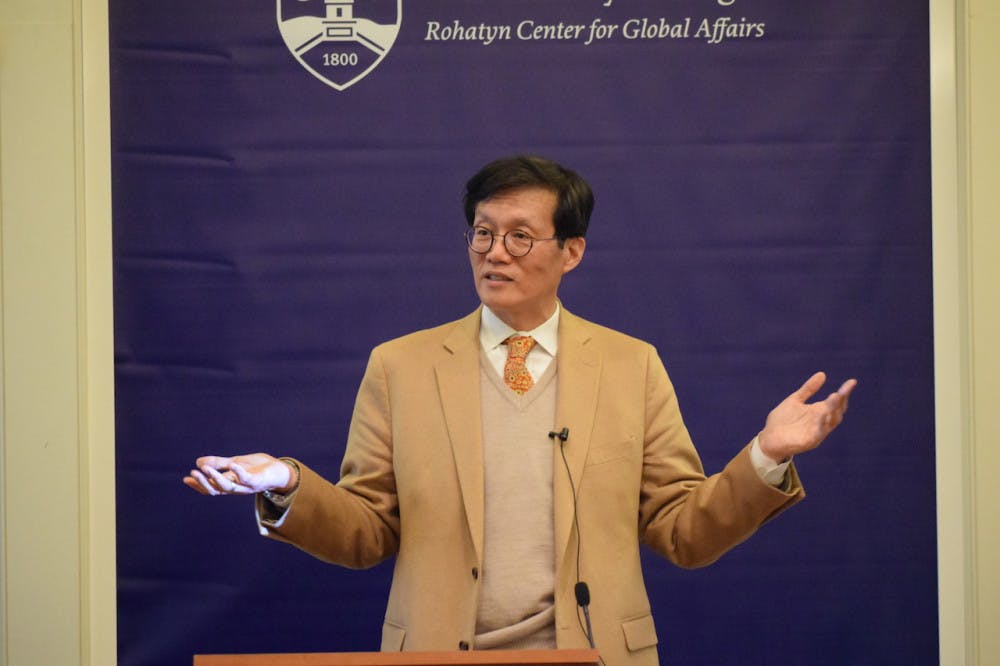Speaking to a full audience in the Rohatyn Center for Global Affairs Conference Room, Changyong Rhee P ’21, Director of the Asia and Pacific Department at the International Monetary Fund (IMF), asserted that Asia must not be ignored in the 21st century.
“I strongly believe that your generation cannot miss the opportunity of China and Asia as a whole,” he said, drawing on his background as an academic, economist, policy advisor and parent.
Rhee’s is the first lecture in the China@70 speaker series, a five-part set of lectures designed to provide a deeper perspective of the People’s Republic of China in light of the 70th Anniversary of its founding and the 40th anniversary of U.S.-China relations.
Allan Lei ’21 played an integral role in designing the speaker lineup. Lei attributes the current tensions and problems between the U.S. and China to people’s lack of understanding about the country. “With this series, I’m hoping to help bridge that divide and allow students to have a more clear understanding of the nation and its growth,” he said.
Before his position at the IMF, Rhee served as the Chief Economist at the Asian Development Bank and the Chairman of the Securities and Futures Commission of Korea, among other roles, and holds a PhD in Economics from Harvard University. The lecture —titled “Can Asia Be a Growth Pole in the Global Economy in the 21st Century?” — revolved around the central question of whether Asia’s immense growth in the past two decades can be sustained. Rhee said that this trend is likely but not pre-ordained, and there are numerous opportunities, risks and challenges.
With a series of maps, Rhee explained that the U.S., Europe and Asia are three regions that dominate global trade and that China’s growth since 2001 was a result of China joining the World Trade Organization and accessing the global market. “This is a reason why the global trade tensions between the US and China started,” he said.
However, despite China’s fast growth, its income per capita is lower than that of advanced economies. “China’s a big country, sure. But are they a rich country? Not yet,” Rhee said.
Elaborating on China’s diverse economic regions, Rhee outlined the dichotomy between the country’s coastal regions with high economic productivity and development issues throughout other parts of the country. This represents a difference in opinion between the U.S. and China — while China would like to still be considered a developing country, the U.S. argues that it has surpassed that status.
Expanding to the larger Asia region, Rhee presented statistics on economic development in India (or the “elephant,” as he called it) and Asia accounting for two-thirds of global growth.
“Whether you like Asia or not…somehow because of the linkages and the growth you cannot completely ignore Asia,” he said.
Despite this optimistic picture of growth, Rhee said that there are risks associated with the rise of Asia on the economic world stage. Trade tensions, especially in light of the U.S.-China trade war and the recent summit between President Trump and Kim Jong-un in Vietnam, could place global economic flows in a state of crisis. “So how is this going to go? We’re really worried about it,” he said.
According to Rhee, additional tariffs placed by the U.S. on China could have a significant impact on the global economy, with China losing as much as 1.5 percent in negative GDP growth. “Our conclusion is everyone will lose. Our managing director said that there are no winners in this trade war,” Rhee said.
With the global economy slowing down, Rhee said that there are key challenges in the trade and financial market that could result in the possibility of a sharper-than-expected China slowdown. Another risk is the aging population in many Asian countries, including China and Japan. Rhee attributes the growth rate in Asia to high productivity of workers. “Our growth rate is due to perspiration, not due to inspiration,” he said. With the rise of the digital economy and mobile payment software such as Alibaba’s Alipay, Rhee stressed that Asian countries will need to overcome problems by investing in new technology and education. “Asia has been doing very well,” he said, but “you cannot just be a copycat.”
Professor of economics and moderator William Pyle said that the series focusing on China’s rise could not be more timely. “He really brought into focus just how important Asia, generally, and China, specifically, have become to the fortunes of the global economy,” he said. Pyle agreed that there are “very real” challenges that the region must confront over the next generation. “Aging populations might be the biggest one,” he added.
The next lecture in the series will be Friday, March 7 at 4:30 p.m. in Axinn 229. Professor Suisheng Zhao, Director of the Center for China-U.S. Cooperation at the University of Denver, will speak on the evolution of Chinese nationalism and its implications on foreign policy.
Speaker Series Sheds Light on China’s Economic Rise

BENJY RENTON/THE MIDDLEBURY CAMPUS
Rhee’s talk was the first of a five-part series sponsored by numerous academic departments, programs and student organizations, including the Departments of Economics, Political Science and the Greenberg-Starr Department of Chinese Language and Literature.
Rhee’s talk was the first of a five-part series sponsored by numerous academic departments, programs and student organizations, including the Departments of Economics, Political Science and the Greenberg-Starr Department of Chinese Language and Literature.
Comments



